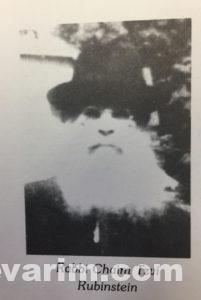Rabbi Chaim Tzvi Rubenstein
חיים צבי ב"ר ישראל הלוי
Rosh Yeshiva, Bais Medrash L’Torah, (Hebrew Theological College), Skokie, IllinoisDate of Death:
Wed. October 25, 1944 -
Cheshvan 8 5705
Anyone with biographical information is asked to please send it in.
See CONTACT page for details. Thank you.
Directions to Kever: Waldheim Cemetery in Chicago maintains computerized records and will provide a detailed location map upon request. Location: Needed
Name Listed on Cemetery Database: Name listed on Marker: Rabbi Rubenstein
Biographical Notes:
Bio Information:
Rabbi Chaim Zvi HaLevi Rubenstein was born in Buten in today’s Belorus in 1872. After his Bar Mitzvah he attended the famed Volozhin Yeshiva and was a devoted disciple of its Rosh Yeshiva, Rabbi Naftali Zvi Yehuda Berlin. While there Rabbi Rubenstein received semicha from many leading Lithuanian rabbis including Rabbi Naftali Zvi Berlin and Rabbi Chaim Soloveitchik. In 1892 the yeshiva was closed by the Russian government, and Rabbi Berlin began to immigrate to the land of Israel. A number of his students, including Rabbi Rubenstein, accompanied him. When they stopped in Warsaw on the way, Rabbi Berlin suffered a stroke and passed away a year later.
While in Warsaw, Rabbi Rubenstein married a young widow, Chaya Sarah, who was a
niece of Rabbi Zadok HaKohen of Lublin, the great Chasidic rebbe and one of the most
seminal thinkers in the Jewish world. The Rubensteins continued to the land of
Israel and settled in Jaffa, where Rabbi Rubenstein’s friend from Volozhin,
Rabbi Avraham Yitzchak HaKohen Kook, served as the Rabbi.
Rabbi Rubenstein founded and headed a small yeshiva in Jaffa known as Yeshiva
Shaarei Torah, and in 1900 he moved to Jerusalem, where he was a member of one of
the rabbinical courts under the aegis of Rabbi Shmuel Salant, the Rabbi of Jerusalem.
Sent on a mission to America to raise funds for the destitute Jewish community in
Jerusalem, he was “captured” by the Jewish community of South Chicago, Illinois to
serve as its Rabbi.
In 1917, Rabbi Rubenstein moved to the Lawndale district of Chicago’s West Side and
served as the Rabbi of Congregation Bnei Reuven, which was located in that area. Two
years later, in 1919, he founded a small yeshiva that met in his home on Douglas
Boulevard. Among his first students were Rabbis Louis Lehrfield, Shepard Baum, and
Rabbi Kramer, who served much later as president of Hebrew Theological College.
In 1921, in conjunction with Rabbis Efrayim Epstein and Saul Silber, he helped found the
Beis Medrash Latorah/Hebrew Theological College and remained as one of its roshei
yeshiva for over twenty years. He was active in the Merkaz Harabonim and was also
involved in kashrut supervision and standards.
A person of sterling character and warm love of people he was immensely respected
and beloved by his students and congregants and the entire Jewish community. He was
a member and leader of the Agudas Bnei Eretz Yisrael, an organization that helped
immigrants to Chicago from the land of Israel. A positive person who saw only the good
in others he visited the land of Israel and saw Rav Kook just before his death, and he
rejoiced in the rebuilding of the country by the Jewish pioneers. He had great confidence
that Torah and Orthodoxy would yet flourish in America, and in Chicago particularly, and
did not despair even though the next generation was already estranged from Jewish
tradition and observance.
Rabbi Rubenstein’s acts of charity and generosity were legendary. He developed cataracts and for a year was unable to see but was still able to deliver his Talmud classes, relying on his memory of the text of the Talmud and its commentators. He was aware of the new and peculiar circumstances of American Jewish life and helped guide the many young rabbis that were the products of HTC in their battle for tradition and Torah.
Rabbi Rubenstein had a melodious voice and had a tradition of leading the Neilah service in his synagogue. After Yom Kippur 1944, he tragically took ill with a heart attack and passed away soon after, on 8 Mar Cheshvan, 1944. After a greatly-attended and emotional funeral, he was interred in Waldheim Cemetery in Oak Lawn, Illinois. Among his descendants are his grandsons, Rabbi Berel Wein and Elijah Schochet, and the well known Jewish community leader Gary Torgow of Detroit, Michigan. A leader of the transitional immigrant generation, his faith in yeshivot and tradition has been amply rewarded.
Biographical Credit: Rabbi Berel Wein, Jerusalem, Israel
« Previous: Rabbi Shmuel ShachNext: Rabbi Nechemiah Robinson »




http://www.hebrewbooks.org/pagefeed/hebrewbooks_org_6562_140.pdf
he.wikipedia.org/wiki/חיים_צבי_רובינשטיין
Rabbi Berel Wine is his grandson
Could it be that he was mechaber a sefer?
also did rav liberman shlitah the chief rabbi of antwerp become rov of his shul after his petirah?
http://web.nli.org.il/sites/nli/hebrew/digitallibrary/pages/viewer.aspx?presentorid=NLI_Ktubot&DocID=NNL_Ktubot_ROS000301430
שטר כתובה מיום יב בחשון תרס”ב בעיר יפו – רח”צ הלוי רובינשטיין חותם כאחד מהעדות
Did Rav Rubinstein leave descendants and do they have his archives?